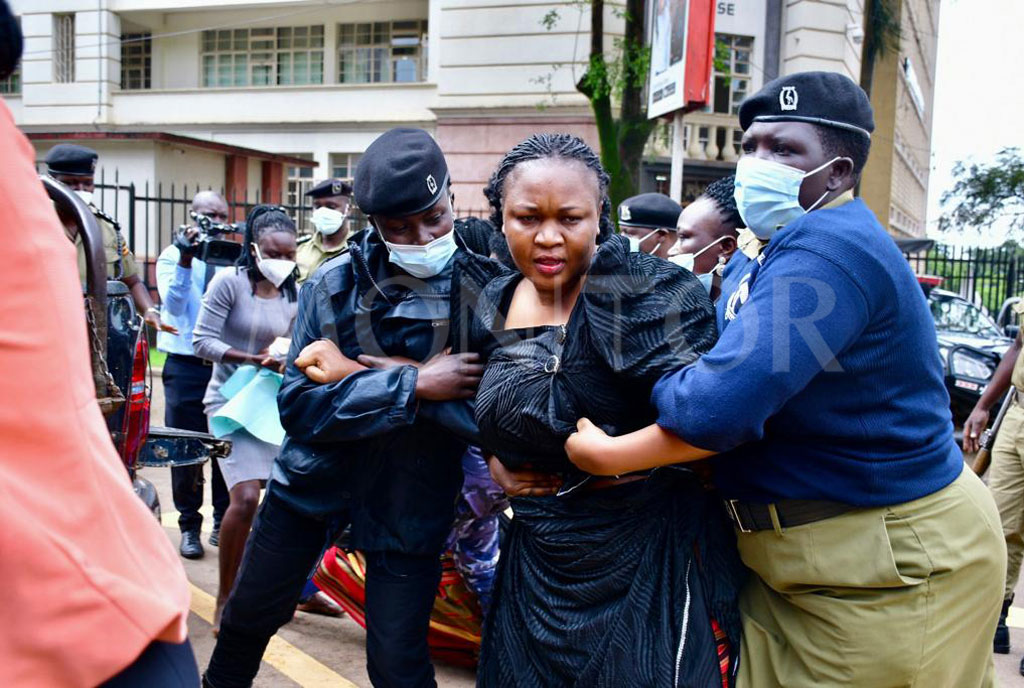Police brutality: Law society to sue individual officers

Police arrest Jinja City MP Manjeeri Kyebakutika during a peaceful march to the Ministry of Internal Affairs to deliver a petition against harassment by security forces, near Parliament on April 27, 2023. PHOTO/DAVID LUBOWA.
What you need to know:
- In the recent past, the police have violently broken peaceful demonstrations, which acts have left some people seriously injured.
The Uganda Law Society (ULS) has come out to warn that they won’t hesitate to legally go after individual police officers who are behind the recent spate of brutality being meted against citizens who peacefully demonstrate.
In their April 25 statement, the lawyers led by their president, Mr Bernard Oundo, reminded the law enforcement officers of how they can be held liable in their individual capacities for torture of Ugandans.
“Individual police officers are also advised that under Section 10 of the Human Rights Enforcement Act, 2019, the law now provides for personal liability of any public officer, who either individually or in association with others, violates any person’s rights and freedoms and legal action can be taken against such an officer as an individual,” the statement by ULS reads in part.
In the recent past, the police has violently broken peaceful demonstrations countrywide, including rallies of Opposition women MPs, who were holding belated celebrations to mark the International Women’s Day in their constituencies.
Some of the notable incidents include arrest of 37 medical interns who were last month marching to Parliament from Mulago while protesting delayed deployment. There was also police’s scuffle with individuals who were demonstrating delayed prosecution of iron sheets suspects, and Makerere University students who were demonstrating what they said were unfair disqualification of their colleagues vying for student political offices.
Others are 11 female legislators who were brutally arrested in Kampala last week as they peacefully marched to Internal Affairs ministry to express their displeasure in the manner in which their colleagues such as the Buvuma Islands District Woman MP, Ms Suzan Nakaziba Mugabi, were arrested by the police.
The 11 female MPs were rescued by Speaker of Parliament Anita Among after she stormed the Central Police Station where the MPs had been detained.
The lawyers have cautioned the police leadership on their continuous reliance on various provisions of the Public Order Management Act, 2013, which provisions the lawyers said have since been annulled by the courts of law for being unconstitutional as they curtail people’s rights to peacefully assemble and demonstrate that are provided for in the Constitution.
In March, the Constitutional Court quashed Sections 5 and 10 of the POMA that banned unauthorised demonstrations and public meetings.
In their findings, the five justices of the Constitutional Court held that these sections, to the extent of imposing penal sanctions on organisers and participants in peaceful public meetings, including demonstrations and assemblies, contravened the Constitution and therefore, were null and void.
The court made the decision when considering a criminal case against the president of Opposition National Unity Platform (NUP) party, Mr Robert Kyagulanyi, aka Bobi Wine, for having participated in demonstrations against high taxes in 2018.
The decision of the court meant that no person could be criminally charged for getting involved in a peaceful demonstration without first seeking permission from the Inspector General of Police as envisaged under Sections 5 and 10 of the Act.
But shortly after the said judgment, the police came out to say there were more laws that they could rely on to break up “unauthorised” assemblies.
“This doesn’t mean that the police don’t have powers to regulate unlawful assemblies. The law provides for the regulation of illegal assemblies under the Penal Code Act. Therefore, we still have powers in place to disperse unlawful assemblies and riots,” Mr Fred Enanga, the police spokesperson, told journalists, a few days after the Constitutional Court decision on POMA.





